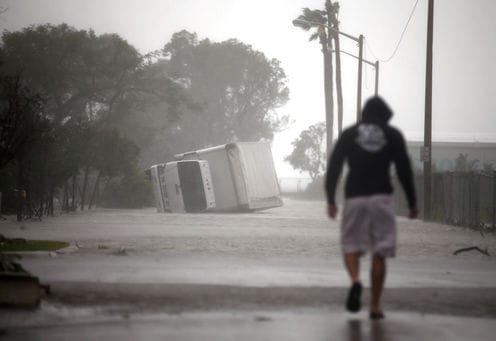
The devastating scenes of destruction and flooding in the Bahamas and the southern states of the US have captivated the world for many weeks now. Hurricanes Harvey and Irma, with Hurricane Jose soon to follow, have stolen headlines around the world, as they break records and provide a deluge of spectacle and image: the main ingredients for tabloid reporting.
As far as the fatalities they have caused – now into the hundreds – they have not been as dangerous as the under-reported monsoons that devastated India, Nepal and Bangladesh a few weeks ago, with death tolls into the thousands.
But, in the oligopolised world of the news wires of AFP, Reuters and AP, threats to developed nations push well ahead of tragedy in the third world, an imperialist bias that reflects the global hierarchy of nation-states as defined by news services.
But is also true that hurricanes (typhoons and cyclones) command more attention because they have a strong visual identity. Unlike monsoonal rains, they are also endowed with a personality.
For a start, each hurricane is given a name, and often they are referred to as “monsters” that have some kind of personality. “Irma is unpredictable, ferocious, powerful”, and so on. Unlike monsoons, hurricanes are to be feared, almost like they are preying on humans.
But in the US, these same hurricanes have been the subject of ridicule and religious divinity.
In between all of the suffering in Texas and now in Florida, conservative radio talk show host Rush Limbaugh, who broadcasts out of Palm Beach, Florida, had labelled Hurricane Irma a kind of fake news.
Limbaugh, a strident Donald Trump supporter, has sought to persuade his listeners that these Hurricanes are wildly exaggerated, potentially endangering those who may not take seriously the official emergency weather warning. He said:
There is a desire to advance this climate change agenda, and hurricanes are one of the fastest and best ways to do it … All you need is to create the fear and panic accompanied by talk that climate change is causing hurricanes to become more frequent and bigger and more dangerous, and you create the panic, and it’s mission accomplished, agenda advanced.
Limbaugh claims that hurricanes bring together three unlikely beneficiaries: climate change activists, TV broadcasters, and retailers – the latter two having a “symbiotic relationship”.
For Limbaugh, TV stations, which receive much advertising revenue from retailers, become fixated with the hurricane, causing panic and mass raids on retail supplies of food, water, batteries and fuel. For the radio shockjock this creates a vicious circle of interests more important than the hurricane itself.
Limbaugh is at least partly right. Tabloid TV is most at home in covering violent events – whether this is extreme weather, terrorism, or violent crime. The more images it has about these events, the more it will cover them.
However, that these same broadcasters will make any significant link to climate change has not been a trend in either the US or Australia. It may increase audience concern about climate change, but not really their understanding that the more energy you have in the oceans, the more potential there is for powerful storms.
Extreme weather is indeed the best time to communicate climate change, but it has to be done in a way that increases audience understanding of the causes, impacts and projections for the future.
It also has to be done in a way that demonstrates what is so different about today’s extreme weather. With Hurricane Irma, for example, what has amazed climatologists is that it was one of a trio of hurricanes that were threatening land at the same time. Irma itself matched the force of Katrina in terrajoules of energy.
Then there are the scenes of Irma literally sucking up the ocean around beaches and changing the shape of coastlines during that period. The forces involved are unprecedented in the modern record.
Yet it seems that the more extreme the nature of the hurricanes, the more extreme are the reactions of climate denialists. And here we can point to the growing number of TV evangelists who are also getting some attention out of the hurricane.
Both Harvey and Irma have been hailed as biblical events that have wrought retribution on those who have not followed the path of god. Televangelist Jim Bakker and pastor Rick Joyner observed last week that “storms don’t happen by accident”. The Houston flood was from God and if, according to Pastor Kevin Swanson, the Supreme Court would rule abortion and gay marriage to be illegal, Houston would have averted a disaster.
Conservative social commentator Anne Coulter tweeted to her 1.7 million followers that Houston’s recent baptism was more likely to be payback for having elected a lesbian mayor in its recent past than it was related to climate change.
Doubtless, the fact that Hurricane Irma has spared the southern White House, Mar-a-Lago, from a direct hit, will also be comfort to Trump’s evangelist supporters. The luxurious resort is again in the news, but this time for not answering calls for Trump to open it as a shelter for displaced Hurricane victims.
Oh, and Rush Limbaugh fled from his home in Palm Beach, two days before Irma hit.
This article first appeared on The Conversation.






